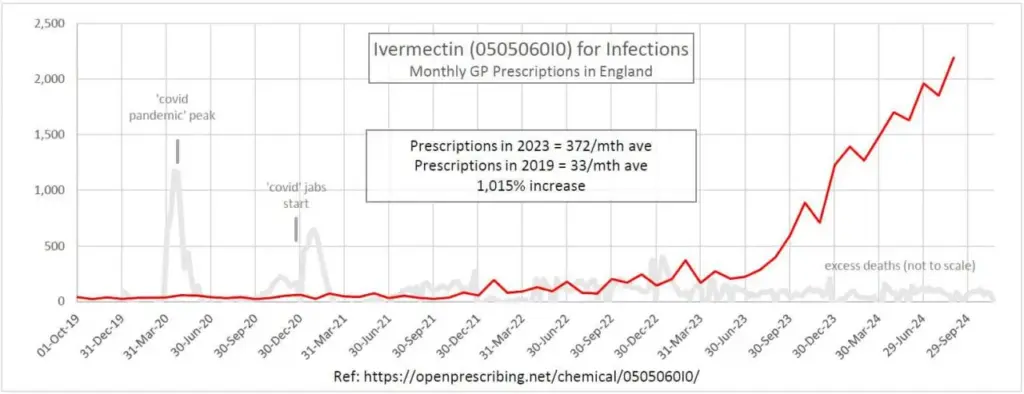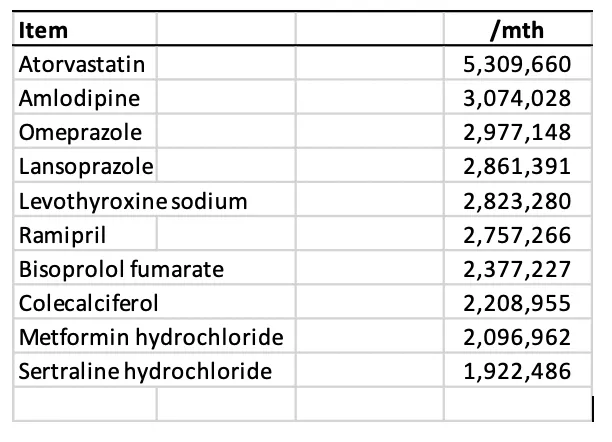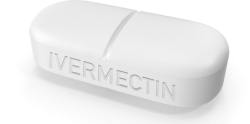Confused about ivermectin? I don’t blame you, but it’s quite simple – just follow the money.
Do you get confused by the relentless ivermectin counter-narrative that raises doubts in your mind about whether ivermectin pills are, indeed, ‘good’ or ‘bad’ – a cheap, safe and established medicine OR a globalist tool to depopulate the planet?
To clarify, it has the potential to be both. Put simply:
- GOOD: In a cheap, generic* 3mg or 12mg pill, the original formulation of ivermectin can be helpful for various infections, inflammation, and even cancer.
- BAD: As novel, long-acting injections, ivermectin could most certainly be used as part of a concoction for an evil plan to depopulate the planet.
*Generic means that any licensed company can make ivermectin pills. It can be produced and sold cheaply. New, long-acting injections under development, however, are patented and can only be made and sold by the Big Pharma investor/inventor. Patented proprietary drugs are usually much more expensive.
This article addresses and counters the ever-weakening arguments against ivermectin. It then identifies who might benefit from discrediting ivermectin.
The Anti-Ivermectin Narrative
Of course, the captured medical authorities and pharmaceutical companies were against ivermectin from the start. Something so safe and effective against ‘Covid-19’ challenged potential huge profits and whatever nefarious plans the tyrants had for humanity. Therefore, ivermectin was banned, strongly discouraged, and ridiculed. Those who could see the bigger picture realised that such transparent propaganda served to confirm their suspicions.
Recently, there have been extreme and ongoing efforts to attack ivermectin, currently only available in an inexpensive, oral formulation, that reveal a telling pattern of shifting narratives designed to discredit it at any cost. The arguments appear less about genuine concerns and more about undermining a cheap, effective, and widely accessible treatment. Each argument presented seems to be grasping at straws, quickly losing traction and credibility, only to be replaced by another, equally tenuous claim. As efforts to undermine ivermectin intensify, these claims are understandably disturbing and confusing for people. Let’s have a brief look at what is being said.
Argument 1:
The ‘pandemic’ was faked so ivermectin couldn’t have actually helped anybody
Initially, ivermectin was attacked for perpetuating the ‘pandemic’ narrative of ‘Covid-19’. This argument, while resonating with some sceptics of the ‘pandemic’ narrative, ultimately failed to hold water for many. Certainly, people became ill – for whatever reason – and certainly ivermectin had helped. However, I have some sympathy for this line of reasoning, as it touched on the broader mistrust of the global response to the ‘pandemic’, which most thoughtful people now realise was faked.
Argument 2:
Ivermectin is a violent infertility drug and being promoted for ‘Covid-19’ as part of a depopulation agenda
When the ‘pandemic’ line of attack fizzled out, the anti-ivermectin narrative shifted to claims that it caused infertility – a serious and emotive accusation that drew from scant evidence based on poorly-conducted animal studies of short duration. It might be expected that any medication has a short-term effect, but infertility is something to be ascertained over a longer period. Indeed, I showed the futility of this argument in an earlier substack article. Thus, this argument, too, failed to gain significant traction, as its lack of scientific grounding became evident.
Argument 3:
Ivermectin, pushed on the population, has led to an alarming increase in prescriptions
The attacks then pivoted to highlight an “alarming” 800% increase in the use of ivermectin. While this figure might sound shocking at first glance, it falls apart under scrutiny. In countries where ivermectin had little to no prior usage, even modest increases in demand could produce such a percentage increase. Also, this increase was in prescribed ivermectin usage. In the UK, this increase started at the beginning of 2022. People had already sought ivermectin for themselves – probably in larger numbers. This further undermines the 800% figure. There was no ‘pushing’ or ‘promoting’ ivermectin. This was a misleading argument by design, attempting to alarm rather than inform.


Argument 4:
Ivermectin is dangerous when combined with ‘certain’ supplements
This argument was rife with inconsistencies and failed to account for the long history of ivermectin’s safety profile, even in widespread use. Furthermore, if it were discovered that ivermectin should not be used with supplements, it would merely require amendment of the instructions for use. This really is grasping at straws and shows an intention to confuse people with the fear of a myriad of uncertainties.
Argument 5:
Bill Gates and the WHO promote ivermectin
Now, there is a new argument that seeks to conflate ivermectin with insecticides, Bill Gates, the WHO, and other perceived “bad actors” in the global health landscape. This new narrative represents a shift into the realm of conspiracy-laden rhetoric, aiming to taint ivermectin by association. It’s a smear tactic designed to prey on emotions and distract from the core issue: ivermectin’s potential to save lives when used for both acute and chronic illnesses, including skin disease and cancers. Do you notice anything similar to the narrative’s hackneyed horse-wormer charge? I’ll go further into Bill Gates apparent motives with ivermectin below.
Argument 6:
Is very convoluted…
Lastly, a recent, very convoluted argument suggested that ‘they’ wanted us to take ivermectin all along! That is, they made it seem that they were coercing toxic jabs on us and blocking ivermectin as a psyop to create a demand for ivermectin – the main depopulation drug! Really crazy stuff, I must say and certainly not borne out in the prescribing statistics above. Oops, there’s a new one: now ivermectin is being labelled as a very scary and deadly neurotoxin…
Why the hard push back against little old ivermectin – safe and cheap?
I will present only three good reasons here, but there are more that I may go into in another article:
1- Oral ivermectin is a considerable threat to new Big Pharma drugs in development targeting skin conditions and cancer, such as prostate cancer, for which ivermectin is showing benefit.
2- Big Pharma and Bill Gates making long-acting ivermectin injections and these injections are planned to supersede oral ivermectin.
3- Lucrative ‘vaccines’ are being developed to target tropical diseases, such as river blindness and malaria, that are successfully managed with oral ivermectin.
Big Pharma and Ivermectin
Oral ivermectin is cheap and readily available. It is safe, and its effectiveness has been proven over many years and, of course, during the ‘Covid 19’ chapter. Ivermectin is on the World Health Organization (WHO)’s Essential List of Medicines in an oral formulation, where it is used in mass administration programmes in low-income countries to combat neglected tropical diseases (NTDs), which affect billions of people worldwide. Having being brought back into our awareness through ‘Covid-19’, oral ivermectin is showing great promise in at least two significant areas of health – skin diseases, such as atopic dermatitis, and cancers, such as prostate, breast and pancreas.
Unfortunately for Big Pharma, these are areas of significant investment. Take Novartis, for example, which has some newly approved anti-cancer drugs, and more on the cards. One, Scemblix, has just acquired ‘accelerated’ FDA approval for myeloid leukaemia. Another, Pluvicto, for prostate cancer is Novartis’ fastest-growing drug with sales increasing 262% in 2023 to $980 million. (Ivermectin costs around 3 cents a tablet to produce, is available over the counter in many countries, and has an unbeatable safety profile compared with most anti-cancer drugs). Novartis is also developing therapies for inflammatory and allergic diseases, e.g. atopic dermatitis, for which ivermectin is a competitor.
As demonstrated, these new drugs are all very profitable activities, benefitting these drug corporations and anyone investing in them or connected to them. The present use of ivermectin – let alone its potential use – runs contrary to their interests. Individuals with investments or contractual obligations with Novartis, for example, would have considerable conflicts of interest when it came to sharing their views on ivermectin. (I have no shares in any drug companies, in case you are wondering.)
Pharmaceutical companies are renowned for their underhand tactics. They would likely support any attacks on ivermectin. But they might also take advantage of its excellent safety and effectiveness by using it in an approved, proprietary way. Injections, with added ingredients, could be one such way.
Bill Gates and Ivermectin
The Bill & Melinda Gates Foundation has played a significant role in funding the development of long-acting injectable ivermectin and is exploring several options. Through the IMPACT Project, the foundation is funding research aimed at creating an injectable version of ivermectin that stays in the bloodstream for six months. In addition, through UNITAID, Gates is invested in the Center of Excellence for Long-acting Therapeutics – a Liverpool University based initiative to create profitable long-acting injections out of safe established generic medicines. Gates has also funded the French company MedinCell to develop a subcutaneous injection of a long-acting ivermectin formulation, available as a pre-filled, ready-to-use syringe, ostensibly for malaria.
While the Gates Foundation promotes its initiatives as solutions to ‘Neglected Tropical Diseases’, a closer look at its activities raises very uncomfortable questions. During ‘Covid-19’ for example, the foundation, through its GAVI alliance, were among the first to dismiss the use of ivermectin for ‘Covid-19’ treatment despite the evidence of its safety and effectiveness.
Gates has stated that his return on vaccine investments is $20 to $1. Returns on a reformulated injectable ivermectin would be hugely profitable, especially with the WHO’s stamp of approval and recommendation for its widespread use in Africa for NTDs.
Potential for misuse of injections
The ‘Covid-19’ chapter, which had an immense impact on health and our right to choose, has shown us the potential for the misuse of injections for profiteering and ideological reasons. Injections give a powerful minority group the means, if they wanted, to interfere in our lives through causing chronic ill-health, genetic manipulation and surveillance (injections can carry chips). For certain ideologues, injections thus offer the perfect solution. Injections offer a direct line of control into peoples’ bodies. Labelling them as ‘vaccines’ and ‘global health solutions’ adds an air of credibility. What better opportunity than the global problem of Neglected Tropiccal Diseases to reformulate ivermectin (and other generic older medicines) as an injection for profit, as well as for ideological motives?
The Solution: No More Injections
The persistence and evolution of arguments against the original formulation of ivermectin demonstrate that the campaign against ivermectin currently is not rooted in genuine scientific concerns but in a deliberate effort to suppress it. Each narrative, when examined critically, falls apart under the weight of its own contradictions and lack of evidence. If the strongest arguments against ivermectin fail, why keep digging for more arguments?
The relentless attacks suggest a deeper fear of what ivermectin represents: a threat to the monopolistic control of health solutions by a few powerful entities. ‘Follow the money’ is often a good indicator.
I hope you can also see that injectable ivermectin raises serious concerns. ‘Covid-19’ has taught us that not all medical interventions are purely about health – they are also about power, control, and profit. The lesson here is clear: please be cautious of injections, particularly those that are promoted as part of a global health initiative.
If you can avoid injections, do so.
The long-term implications could be far-reaching, and we must now always question who is promoting and administering shots of any kind – and why. Equally it may be worth questioning the motives, financial or ideological, of individuals and organisations that continue to undermine this little old oral medicine that has been used successfully for human and animal diseases for a very long time.
Thank you for your support.
If you find value in these articles, please consider becoming a paid subscriber to this Substack. Your financial support is very much appreciated by me and the WCH Team.



